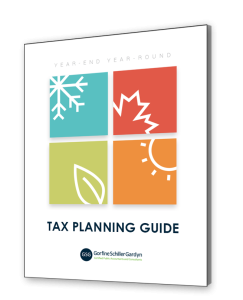For many people, determining whether to rent or buy a home can be a major decision – often with key tax and cost benefits on both sides of the coin. And with the recent passing of the Tax Cuts and Jobs Act, many people have been questioning the viability of homeownership from a tax perspective.
“For many, tax reform will make renting more attractive than owning a home,” said Laurie Goodman and Edward Golding, researchers at the Urban Institute, in this Money Magazine article.
The reality is that the impact of new tax legislation will not be that tremendous. The new law doubles standard deduction to $12,000 ($24,000 for couples) and limits certain itemized deductions related to owning a home. It adds a $10,000 cap on the state and local tax deduction (income tax and real estate tax combined) and the Act reduces the mortgage interest deduction to interest on $750,000 of acquisition indebtedness interest for debt incurred after December 15, 2017. The $1 million limitation remains for older debt.
While the Act potentially lowers taxpayers’ bills, the increased standard deduction may minimize the tax benefits of home ownership, which may push more consumers into renting versus buying, as highlighted by the Urban Institute.
As such, consumers should always consider the tried-and-true fundamentals when determining whether to buy or rent. Here are the top three reasons for both options:
Top Three Benefits of Homeownership:
1. Long-Term Investment: Owning a home is a long-term investment that can help build equity and credit for supplementing retirement savings.
2. No Landlord: By owning a home, you can be the king or queen of your domain, allowing you to make any renovations to fit your style.
3. More Stability: Unless you have a hard time making your mortgage payment, homeownership offers you long-term stability, and can allow you to target ideal school districts.
Top Three Benefits of Renting:
1. Renting is Often More Cost-Effective: Rents are typically lower than mortgage payments, and you can more cost-effectively live in nicer neighborhoods.
2. More Freedom and Flexibility: Renting allows you to have more freedom and flexibility, so you can move whenever your lease is up.
3. Fewer Upfront Costs and No Maintenance: Unlike a mortgage that requires a 20 percent down payment, there are much fewer upfront costs, and your landlord will cover any maintenance expenses.
As highlighted by the Urban Institute, the breakeven point at which it makes more sense to own, can differ depending on family income. For a middle-class family making $50,000, the Act made little difference, mostly because taxpayers would likely have elected to take the standard deduction. For a family making $75,000, it may be best to consider renting when monthly rent exceeds $1,017. It climbs even higher for wealthy families making $300,000, where the breakeven rent is $3,631.
Overall, the new tax implications will not significantly change home buying trends in the U.S. However, whether renting or buying, it all comes down to the best option for you and your family.
If you have any questions about the topics discussed in this blog post, please contact our tax professionals today.
Categories: Tax, Real Estate




